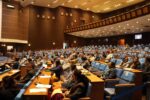Can diplomacy complement the government of Bangladesh to pursue international action that will help manage the impact of climate change?
Although not a significant contributor to climate change, Bangladesh is one of the countries that is most at risk from its projected impacts. In an attempt to address the fundamental concerns, negotiation across level has emerged as an impending and worthwhile force for Bangladesh.
The role of Bangladesh in the UN-led Conference of the Party (COP) held in Poland has been commended. Despite this sort of encouraging effort, climate negotiations of the government of Bangladesh are not formally bent yet.
Climate diplomacy: a new era in foreign policy
Climate change has been one of the conspicuous encounters of the 21st century as increasing evidence of the impacts of climate change and those human actions are contributing to changes in climate.
Addressing the climate change challenge requires new thinking in foreign policy—thinking that considers engagement on climate change not only in the sphere of the environment but also outside the environment box.
The recent COP 24 held in Poland was critical for the government of Bangladesh to ensure the interest of the country in the forms of technology cooperation, capacity building, and financial support.
Bangladesh pursues a moderate foreign policy that places heavy reliance on multilateral diplomacy, especially at the United Nations. Climate negotiations result in the promotion of mitigation and adaptation of climate change impact.
Bangladesh: the worst victim to climate change
According to current scientific understanding, the state of well-being and survival of the people in Bangladesh will be under serious threat from climate change over the coming decades.
Being associated with various natural and climate change-induced hazards, Bangladesh has been the worst victim in the world.
Since independence in 1971, the country has endured more than 200 disaster events like cyclones, storm surges, floods, tornadoes, earthquakes, droughts, and other calamities causing more than 500,000 deaths and leaving prolonged damage to quality of life, livelihoods, and the economy.
Legislative actions of Bangladesh for Climate Change Adaptation
Over the years, Bangladesh intensified its effort to tackle climate change through the development of the Bangladesh Climate Change Strategy and Action Plan (BCCSAP). BCCSAP strongly emphasizes fruitful negotiation involving expert envoy(s) at the national and internal levels to address the worst impact of climate change.
The National Adaptation Programme for Action (NAPA) highlighted the prediction on changing patterns of temperature, rainfall, and sea-level rise in Bangladesh due to climate change impact.
Climate negotiations and Bangladesh’s Endeavour
Bangladesh pursues a moderate foreign policy that places heavy reliance on multinational diplomacy, especially at the United Nations.
Bangladesh’s endeavor towards making the best use of diplomatic affiliation in an attempt to address the issue of climate change is noticeable.
Bangladesh should attempt to strengthen the cooperation with Bangladesh in this regard on the basis of “equal consultation, mutual benefit, and common development.
The Ministry of Foreign Affairs (MoFA) to the government of Bangladesh has a major role to play in global climate negotiations.
Bangladesh is found to display an effective role in this area. Bangladesh’s endeavor towards making the best use of diplomatic affiliation in an attempt to address the issue of climate change is noticeable.
Bangladesh’s government deliberately presents itself “as the worst victim, peace-loving, and responsible actor and as a poor developing country.”
Both discourses are designed to accomplish the broader diplomatic agendas. Bangladesh was found to be in a positive effort to play a leading role in the last Conference of the Parties (COP).
Given the importance of this topic for Bangladesh in the future, Bangladesh should consider appointing a personal “special climate change envoy/adviser” to make sure the effective representation of Bangladesh at important high-level international meetings.
The 21st Conference of Parties or CoP21 of the United Nations Framework Convention on Climate Change (UNFCCC) was ended with all the 195 member countries of the planet agreeing to the “Paris Agreement” from November 29 to December 11, 2015, at Le Bourget in Paris.
Similar to CoP21, Bangladesh had a team led by the Minister of Environment and Forests in CoP23 where a large presence of scientists, think tanks, civil society organizations, NGOs, private sector, and media from Bangladesh.
The recent COP 24 held in Poland was critical for the government of Bangladesh to ensure the interest of the country in the forms of technology cooperation, capacity building, and financial support.
Delegates from Bangladesh have displayed their negotiation skills while articulating their strong voice for easier and effective access to the support mechanisms for implementation of the Paris agreement.
How can Bangladesh accelerate climate diplomacy?
To achieve the vision of becoming a middle-income country by 2021 and a rich country by 2041, Bangladesh must be capable of integrating all aspects of climate change into its planning and delivery of services to the citizens and ecosystems.
Even, there has long been a discussion in some government, civil society, and planning sectors to set up a new Ministry of Climate Change in Bangladesh and Bangladesh has made remarkable progress.
The great move we have observed on May 14, 2018, as the cabinet changed the name to Ministry of Environment, Forest and Climate Change.
Given the importance of this topic for Bangladesh in the future, Bangladesh should consider appointing a personal “special climate change envoy/adviser” to make sure the effective representation of Bangladesh at important high-level international meetings.
The number of both developed, as well as developing countries, has appointed such “special climate change envoys/advisers”.
Nevertheless, Bangladesh should maintain its favorable image as a cooperative partner of the international community.
The fear of losing face may constrain its behaviors. In particular, the Bangladesh government particularly the Ministry of Foreign Affairs must applause diplomatic negotiations in a win-win agreement.
(Dr. Mohammad Tarikul Islam is an Associate Professor in Government and Politics at Jahangirnagar University in Bangladesh)









Comment